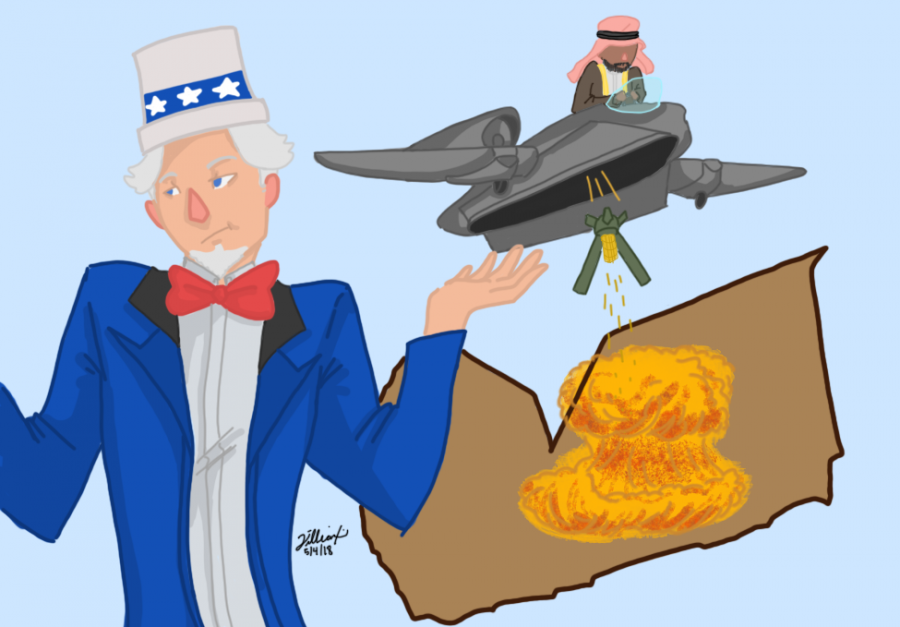America’s relationship with Saudi Arabia is out of control. By slapping down a proposal that would have forced a vote to withdraw U.S. support for Saudi Arabia, Congress made clear its goal to combat Iran’s interests in Yemen at all costs—even if it means ignoring the inevitable moral conundrums that arise when a country that is supposed to be the keeper of peace, freedom, democracy, etc. is arming and abetting a terrorist regime’s genocide.
Saudi Arabia’s quest to restore the short-lived transitional government in Yemen is an instance where the costs of U.S. support outweigh the benefits. Here’s an assessment of the outcomes thus far: five thousand civilians dead, many more displaced from their homes, a cholera outbreak and seven million facing a famine. It doesn’t take the utopian fallacy to acknowledge the preventable nature of what’s being called the worst humanitarian crisis in the world.
Proxy wars like America’s involvement in Yemen persist because they go completely unnoticed by the public, whose disgust for repulsive regimes is reserved for Syria. Nationalism is an important value for many Americans, and we’d feel more compelled to act if there were boots on the ground suffering in the Yemen civil war. Does it take Saudi Arabia killing its own citizens for us to take notice? On the other hand, Saudi war crimes have spurred public outrage in countries like Germany and Austria, both of whom stopped issuing licenses for arms sales to the Saudi coalition as a result. American exceptionalism at its finest.
To make matters worse, Saudi Crown-Prince Mohammad Bin Salaman continues to woo journalists and solidify his Kingdom’s role as America’s much-needed bedfellow in the cold war against Iran, the rebel forces’ benefactor in Yemen.
Salaman told an American journalist he hopes the Houthi rebels, the force fighting the Yemeni government, cease “using the humanitarian situation to their advantage in order to draw sympathy from the international community. They block humanitarian aid in order to create famine and a humanitarian crisis.”
Salaman is right that the rebels shouldn’t be given sympathy. However, this isn’t about the rebel militias—it’s about the needless pain and suffering that is overwhelmingly the result of Saudi Arabian—not rebel—targeting of marketplaces, hospitals, rehab centers for the blind, funeral homes. It’s also their illegal use of cluster bombs and refusal to lift blockades on air and seaports where medicine is supposed to come in. America’s billions of dollars in arms shipments is the one thing enabling the Saudi’s lack of compunction, like how the pipsqueak on the playground can freely bully others because he’s pals with the biggest kid on the block.
Now, Saudi Arabia is lobbying a law firm that has assisted Trump in his real estate empire $450,000 for a 30-day period, in exchange for a bilateral agreement to secure U.S. nuclear technology for civilian purposes in Saudi Arabia. Here, the Trump administration can’t be incredulous enough towards the Saudi’s true ambition— to compete with Iran on a nuclear scale. It’s why our bedfellow refuses to ratify the expansion of International Atomic Energy Agency (IAEA) protocol or prohibit uranium enrichment. The 123 Agreement “gold standard” restriction on uranium enrichment needs to be kept in place. Business cannot take priority if America is to be a leader in containing nuclear proliferation.
Crown Prince Salman and company run a totalitarian regime governed by the “most dangerous religion in the world,” and with each subtle wink of America’s approval, it becomes more imprudent, murderous, and unaccountable to international law. Painful allies are necessary, but not when we create monsters.










